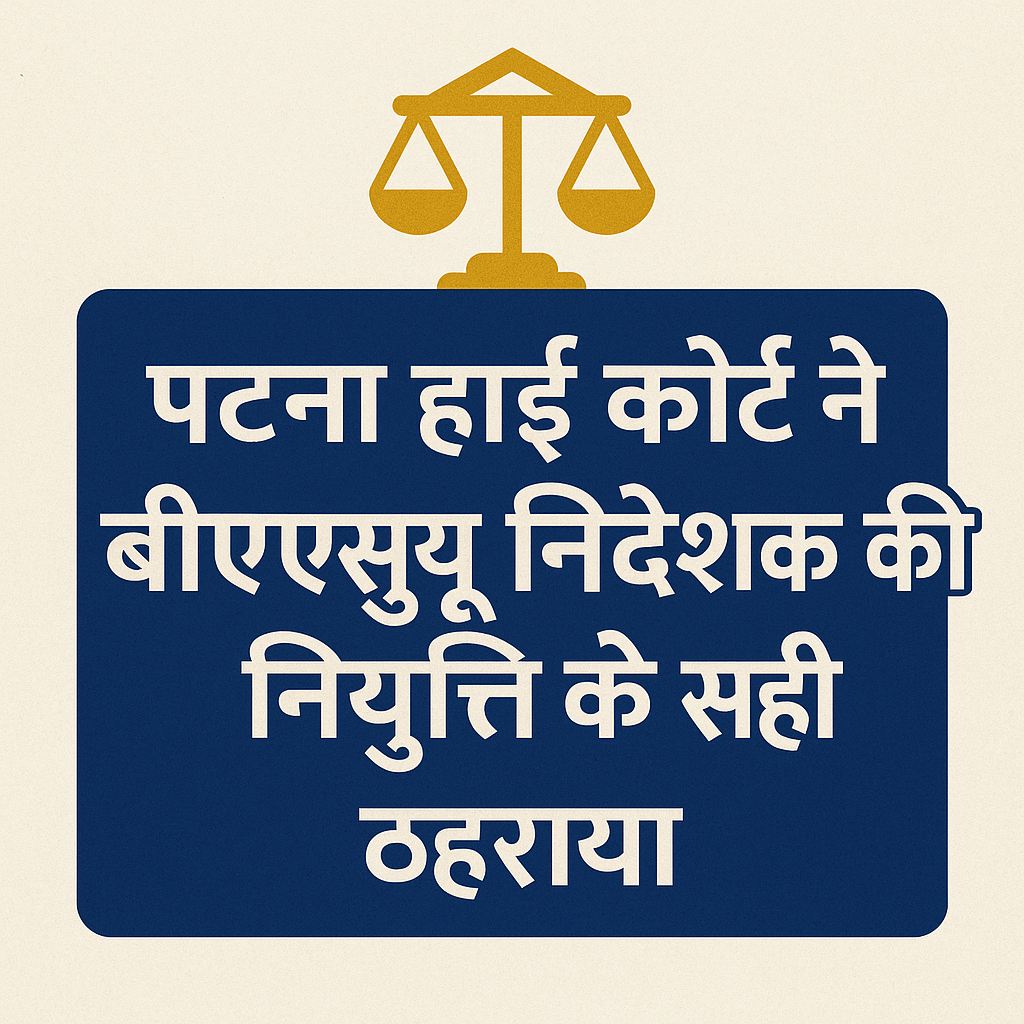Simplified Explanation of the Judgment
In a recent judgment, the Patna High Court dismissed a writ petition challenging the appointment process of a Director at Bihar Animal Sciences University (BASU), Patna. The case revolved around the selection of a candidate for the position of Director, Extension Education, and the petitioner’s claim that the selection was arbitrary and manipulated.
The university had issued three successive advertisements for the same post: Advertisement No. 2/2018, followed by No. 5/2019, and finally No. 6/2019. The petitioner, who held relevant qualifications, applied under the latest advertisement and appeared for the selection test. However, he was not selected, and the post was given to another candidate (the respondent), who had qualifications in Agriculture rather than Veterinary or Animal Sciences.
The petitioner alleged that the eligibility criteria were unfairly broadened to include “Allied Branches” in order to favor the selected respondent. He also argued that the earlier advertisements did not include such provisions and hence, altering them mid-way was arbitrary and mala fide.
The university responded that the changes in eligibility were made because the initial advertisements failed to attract sufficient qualified candidates. The decision to include “Allied Branches” was aimed at expanding the candidate pool and was within the university’s discretion.
The High Court examined the case and observed that the petitioner was fully aware of the revised eligibility criteria when he applied. Since he chose to participate in the process with full knowledge, he could not later question the same process when he was not selected. The court emphasized that selection processes conducted by expert committees are generally not open to judicial interference unless there is clear evidence of bias or arbitrariness.
The court relied on multiple Supreme Court decisions to underline that the judiciary should not act as an appellate body over expert selection committees, unless there’s a demonstrable violation of constitutional or legal norms.
Ultimately, the court held that there was no illegality or arbitrariness in the university’s actions, and the selection process stood valid. The writ petition was dismissed.
Significance or Implication of the Judgment
This judgment is significant for both public institutions and job applicants. It reinforces that changes in eligibility criteria during recruitment are permissible if done transparently and for legitimate reasons like expanding the pool of candidates. It also makes clear that once a candidate participates in the process, they cannot later contest its terms unless they were fundamentally illegal or discriminatory. This protects universities and government bodies from unnecessary litigation and delays.
Legal Issue(s) Decided and the Court’s Decision
- Was the change in eligibility criteria from Advertisement No. 2/2018 to 6/2019 arbitrary or illegal?
→ No. The Court held that the university acted within its discretion to broaden eligibility due to lack of applicants. - Was the inclusion of “Allied Branches” in educational qualifications valid?
→ Yes. The Court did not find this inclusion to be mala fide or unreasonable. - Can a candidate challenge a selection process after participating in it with full knowledge?
→ No. The Court held that such a challenge is not maintainable once the candidate has willingly participated. - Was there a need for judicial interference in the expert selection committee’s decision?
→ No. The Court emphasized that courts should refrain from intervening in expert committee decisions unless bias or illegality is evident.
Judgments Relied Upon or Cited by Court
- Union Public Service Commission v. M. Sathiya Priya, (2018) 15 SCC 796
- Baidyanath Yadav v. Aditya Narayan Roy, (2020) 16 SCC 799
- Basavaiah v. Dr. H.L. Ramesh, (2010) 8 SCC 372
- Bedanga Talukdar v. Saifudaullah Khan, (2011) 12 SCC 85
- Ramesh Chandra Shah v. Anil Joshi, (2013) 11 SCC 309
Case Title
Dr. Safeer Alam v. State of Bihar & Ors.
Case Number
Civil Writ Jurisdiction Case No. 5223 of 2021
Citation(s)- 2025 (1) PLJR 262
Coram and Names of Judges
Hon’ble Mr. Justice Bibek Chaudhuri
Names of Advocates and who they appeared for
- For the Petitioner: Mr. Sanjay Kumar Verma, Mr. Abhishek Kumar, Mr. Onkar, Advocates
- For the BASU: Mr. Anjani Kumar, Sr. Advocate; Mr. Alok Kumar Rahi, Advocate
- For the State: Mr. Abador Rahman Shakeb, AC to AAG-12
Link to Judgment
MTUjNTIyMyMyMDIxIzEjTg==-ziJYrymqnLA=
If you found this explanation helpful and wish to stay informed about how legal developments may affect your rights in Bihar, you may consider following Samvida Law Associates for more updates.









